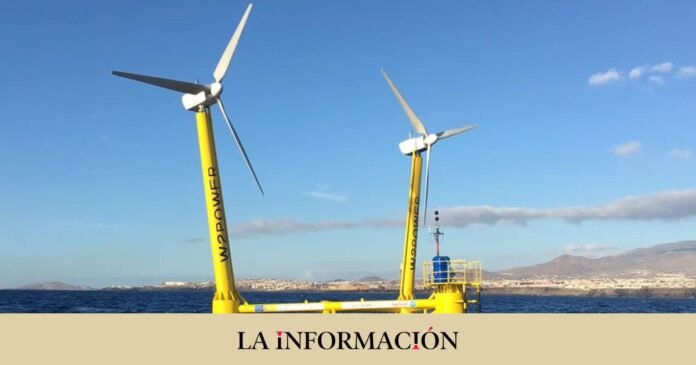The Ministry for the Ecological Transition and the Demographic Challenge launches a public hearing on the draft Royal Decree that will regulate the production of electrical energy in facilities located at sea, that is, offshore wind – and other technologies -. The regulatory proposal proposes to simultaneously grant, through a competitive competition procedure, the economic regime for renewable energy and the reservation of network access capacity, as well as the concession of use of the public-maritime-terrestrial domain for a shorter period. . maximum of 30 years.
The portfolio headed by Teresa Ribera has reported in a statement that the contests that will be used to grant these rights will take into account economic and technical criteria – price of energy, quota of power to be granted, solvency of the participants, characteristics and requirements of the technology, etc. In addition, the assessment can include the occupation of space, the minimization of environmental impact, plans for dismantling equipment at the end of its useful life, the creation of employment and local industry, the participation of SMEs, the impact on navigation. . not support for other economic sectors, such as fishing.
Likewise, taking into account the complexity of the projects, there may be a public-private dialogue phase, in addition to the usual public participation and hearing procedures, to increase their positive socioeconomic externalities and favor their integration and compatibility with other uses of the sea. . The regulatory framework will affect offshore wind installations and other marine energies, such as wave energy, that produce energy throughout the marine territory under Spanish jurisdiction.
Maritime space planning
To achieve the development objectives of offshore wind and sea energy, Ecological Transition has approved the Maritime Space Management Plans, a zoning instrument for the different uses of the sea (fishing, navigation, energy production…), which includes 19 High Potential Zones (ZAP) for the installation of offshore wind turbines, with a surface area of 5,000 square kilometers, 0.46% of territorial waters. After the organization of the marine jurisdictional space, it is now time to approve the aforementioned regulatory framework.
“The development of marine energies is a priority for the Government, which has already allocated 147 million euros for pilot demonstrator projects and testing platforms for marine renewables within the framework of the Strategic Project for the Recovery and Economic Transformation of Renewable Energies, Renewable Hydrogen and Storage (Perte Erha)”, highlights the writing.
Goals in offshore wind and other marine technologies for 2030
The Offshore Wind and Sea Energy Roadmap, and the update of the National Integrated Energy and Climate Plan (PNIEC) 2023-2030, establish the objectives of reaching up to 3 GW of Offshore Wind and up to 60 MW from other sources renewable marine until the end of the decade. “This development, orderly, respectful of the environment and compatible with other uses and activities at sea, will generate important economic activity and will create some 40,000 jobs,” the ministry stated in the note.
The regulatory framework was expected before the end of 2023, as announced by the Secretary of State for Energy, Sara Aasegen. From the energy sector they had been asking what would happen with the deployment of offshore wind after the general elections on July 23. Carrying out the POEM already cost the Government four years of work and a difficult consensus between all the ministerial departments with powers at sea, the coastal autonomous communities, the sectors involved and civil society.
The sector’s biggest concern is that Spain could fall behind Portugal and France. The Portuguese country has already called its first offshore wind energy auction, with the aim of reaching 10 GW of installed capacity by 2030, seven more than our country. For its part, France inaugurated its first offshore wind farm in September last year in Saint Nazaire, with 80 wind turbines and a power of 480 MW. But the French country has put it into sixth gear and has already launched two new tenders for a total of 2.5 GW.
The idea of the Spanish Executive was to hold the first power auction within the first half of last year, but the early elections meant a 180-degree turn in the country’s political and economic scene and many issues were left on standby. While working on the design of the projects, some promoters have already requested the scope of the environmental impact study, a tool that does not imply any commitment on the part of the company or the Administration.
Sector potential: contribution to GDP and job creation
The White Paper on the Offshore Wind Industry in Spain, prepared by the Wind Business Association (AEE) in collaboration with Deloitte, estimates a direct contribution of the sector to the GDP of 6,116 million euros for the period 2025-2030, considering a scenario in which that 75% of the activities are carried out in the country. In addition, 1,860 million euros would be added related to the operation and maintenance activities of the parks, ship construction, etc. Furthermore, in terms of employment, the employers’ association estimates that offshore wind technology will generate 7,523 new jobs between 2025 and 2030 – 17,438 specialized professionals by 2045-2050.
Along the same lines, CCOO believes that floating offshore wind energy will boost sectors such as shipyards, shipbuilding and the metallurgical industry. The union also points out that it is an “excellent opportunity” to help the electro-intensive industry reduce its costs and to boost the production of green hydrogen.
For its part, the Platform in Defense of Fisheries and Marine Ecosystems (formerly the Burela Manifesto Platform), which brings together representatives of the Canarian, Galician and Asturian fishing sector, has denounced “the total contempt” of the vice president towards fishermen and affirms who have not obtained a response to their last request sent to Ecological Transition on February 1. They regret that they have been two years behind achieving an appointment with the minister.

